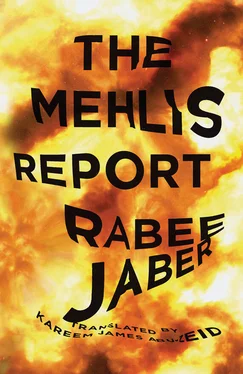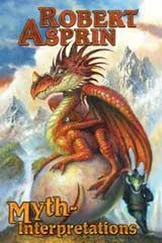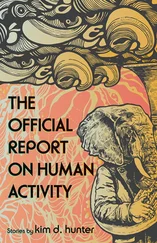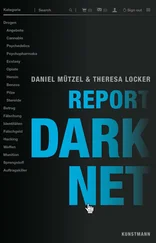Cecilia says the cashier told her Abeela closed the supermarket because of all the ghost stories, and because one of the parking lot workers disappeared. Abeela shut the place down without a word of warning. He didn’t even pay the employees any compensation.
Saman says he remembers the employees standing with their signs and protesting in front of the iron gate of the locked-up building — how many years ago now? It wasn’t that long ago. They were holding up their signs and demanding compensation. Others were sitting on the sidewalk and eating sandwiches: mortadella sandwiches, and sandwiches with fresh yogurt, and sandwiches filled with yellow cheese. He was heading up to the Starbucks on Sassine Square, or to the Chase restaurant, or to Duwayhi Sweets, or maybe even to the Wakeem restaurant, and could see the women who used to work at the supermarket sitting and smoking their cigarettes beneath the open parasols that protected them from the rain. And when the sky cleared up, he saw them looking at the buildings across the way: high-rises with Bangladeshi and Sri Lankan women cleaning the balcony windows. They were standing outside the windows, high above the street, on those small concrete basins that are attached to the buildings where people put their plants. They were standing out there in their pink clothes and cleaning the windows, and also the basins beneath their feet. One of them was desperately clinging to the broad window in front of her as she wiped the glass, terrified of falling backward. And the newly unemployed women were silently watching her from down below.
Cecilia says Monoprix bought the place for next to nothing: it has a lot of space, and the parking lot is huge, and the location excellent. All of Achrafieh does its shopping there now. The Monoprix has ruined the other stores, big and small. All of them do less business now, all of their profits have dwindled, and some of them have closed. The Saint Elie supermarket is practically empty now. The Aoun still has customers, but not like before. Do you remember, Cecilia asks, when the Embassy Supermarket used to be there, where the Aoun is now?
Saman Yarid asks her in turn: Do you remember when there was a cinema on that same spot, before it was a supermarket? Do you remember the Embassy Cinema?
I remember, Cecilia replies. It had red seats.
I used to love the food at the Abeela, says Saman. That supermarket had a different layout. The food was on the upper level — the street level. Why did Monoprix move the food section underground? We used to sit and eat at tables between the big refrigerators at the entrance to the Abeela. They didn’t use that level for clothes back then.
Cecilia says a lot of people drive there, and the parking lot’s underground: the people here don’t like going anywhere without their cars.
Saman asks her if she remembers what it looked like outside the windows of her place ten years ago, before the Sons of Neptune Club was torn down and all these high-rises went up?
She says the house used to be flooded with light at sunset. The walls turned red, and so did the TV. But the steel rooftops of the ABC complex buildings have blocked the view. She lets out a short laugh and asks: Why don’t you join the club? They’ve opened it again.
They opened it a few weeks ago in a different building, he says, but it’s not the same. They put up a sign with the old name on it and the date of its founding, but it’s not the same club we used to go to. Where’s the basketball court? Where are the bleachers? Where are the high ceilings?
Cecilia says she loves looking at the mall in the evening. Through the four iron bars of her bathroom window, she can see all the couples on the escalators: men and women, young and old, going up or going down. She loves that view, especially in winter — there’s less noise in winter.
Sunday, October 9th. It’s hard to sleep without air conditioning. Before he went to sleep, his head was starting to ache. “My head was hurting because I hadn’t slept the night before.” But now he wakes up with an awful headache. What time is it? Two o’clock in the morning. It’s technically Monday now. Two-fifteen. “My head was killing me. It felt like there was a tumor inside it, threatening to shatter my skull.” He remembers a movie he saw at the Empire Cinema about people who eat monkey brains. (He looks at the woman lying next to him on the narrow bed, sunk in sleep.) They broke the monkeys’ skulls open (from the top) while they were still alive, and ate the brains with a spoon. The thought helps his headache. “I opened the window, and as I sat in bed I saw the lights on Beirut’s hills overlooking the Bay of Dawra, and the black ghost of the mountain of trash in the Burj Hammoud district. A solitary star was shining in the sky.” This night. This extreme heat. As he was falling asleep earlier, he’d heard a strange noise beyond the wall, as if it were raining on the tiles. But it wasn’t raining. On the morning of Wednesday, September 28th, it had rained for fifteen minutes in West Beirut. Liliane told him about it. She was on her way to the Hamra district. She went into a store, and when she came out she saw people opening their umbrellas, and felt a few drops on her face. It didn’t rain in East Beirut, but it did rain in Hamra. He’d thought it might have been raining earlier that night, before his headache woke him up.
What’s he doing here? He leaves the bed and walks into the kitchen. The apartment is cramped. He doesn’t know how Liliane can live with her friend. The place isn’t big enough for one person, let alone two. What’s he doing here? This headache — the alcohol thick in his head, as if it were stuffed with coarsely ground iron.
He closes the kitchen door and turns on the light. He moves very slowly — he doesn’t want to wake her up. He makes a pot of coffee and sits down at the table. With the first sip of the strong coffee, he can feel a hole start expanding inside his head. “That’s good,” thinks Saman Yarid.
There are newspapers on the table. Newspapers and magazines, and a bag of raisins and dried apricots. Last Sunday’s paper. What was he doing on Saturday October 1st (eight days ago now)? The first day of the month: the police were defusing a bomb beneath Judge Khoury’s car — the judge in charge of the case surrounding the Al-Madina bank. “Sources have said the case is tied to the work of the international investigation commission, and that the commission was attempting to establish a link between Al-Madina’s bankruptcy and certain sums used to finance the deadly attack on the motorcade. ” A neighbor returning to her home on the Sahel Alma Highway (between the Adma suburb of Beirut and the Keserwan district northeast of the city) at a late hour had seen two people behind the car in a parking lot. The two then fled on a motorcycle. The motorcycle shattered the silence of the night. A Member of Parliament later held a televised press conference: he said the judge’s family had, from the third floor, seen a man jump over the wall of the parking lot, perhaps because the building’s entrance was fitted with surveillance cameras.
Yesterday (Saturday, October 8th) an earthquake struck Pakistan. Earlier, on the TV, they said there were thousands of dead and wounded. Now Saman looks at the pictures in the paper. “The Pakistani Interior Minister said entire cities and villages in Kashmir have been wiped out.” A second sip of coffee. Hot. Bitter. “This is good.” The hole is expanding, the hole in the wall of his head, releasing the ground iron and the pressure. There must be some aspirin in these drawers. Aspirin or Panadol. This headache. This heat. Saman Yarid thinks about his uncle who died of a brain tumor (he wasn’t really his uncle, but when Saman was small he used to call him “my uncle”): the deceased Baseel Yarid. He left his house to a charitable organization that belonged to the diocese — the Beirut diocese of the Melkite Catholic Church. Every time Saman passes by that church, in front of the upper Jesuit entrance, his uncle crosses his mind. Sometimes he passes by the white building where the Cozmo restaurant is located, and then by his uncle’s house. He often stops there to look at the trees and plants surrounding the house, and he always notices the cracked tiles. There’s another old building behind his uncle’s, on Youssef Sader Street: the Samaha family lived there. The “Greek House” was located at the end of the street (which was a dead end): it belonged to a Greek woman who was often talked about when Saman was a child. She rented out some rooms, and once a shipmaster came — a shipmaster from Cyprus with white hair and a red face — and rented the room on the third floor. Saman remembers being at the end of the street when he was just a boy and looking at the Greek woman’s customers sitting and laughing and eating in the garden in front of that house, its doors wide open. He remembers a table with a deep oblong bowl. That clear glass bowl was full of green salad with onions and tomatoes. There were large glasses of arrack beside it. They looked like glasses of milk. Smoke and smells were rising from the brazier beneath the palm tree. The shipmaster was taking pieces of chicken from a dish and placing them on the wire grill above the brazier. The Greek woman was laughing, sending ripples through the fat in her arms. The smell of grilled meat, and yogurt, and garlic.
Читать дальше












